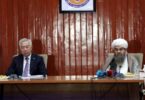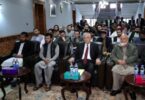KABUL (Agencies): The West has inflicted catastrophic damage on Afghanistan and its own reputation by imposing a policy of starvation on the country, said the UK’s former foreign secretary David Miliband, who is now chief executive of the International Rescue Committee.
“If we wanted to create a failed state we could not have a more effective policy mix than the one we have at the moment,” he told the Guardian. Miliband has been instrumental in lobbying the Biden administration and the World Bank to release Afghanistan’s frozen assets, not only for humanitarian aid but also to start reconstructing the economy, the Guardian reported.
“I simply do not understand the lack of urgency to get this thing moving. It genuinely befuddles me that we should have allowed this to get so much worse so quickly,” he said. He told the Guardian the crisis was so deep that the UN’s appeal for $4bn this year, due to be addressed at a pledging conference next month, was likely to rise to $10bn next year.
The Guardian reported however that reports have emerged that the World Bank board may meet in March to release as much as $1.3 billion that it has so far refused to release. “What we are doing is not making it worse for the Taliban (IEA), it is making it worse for the people. We are not punishing the Taliban (IEA). It is ordinary Afghans that are paying the price of peace. It is not just a catastrophe of choice, but a catastrophe of reputation. This is a starvation policy,” Miliband said.
He said four problems needed to be addressed urgently if the country was to survive the remainder of the winter. “There is no money to pay salaries. Some teachers and hospital workers have not been paid since April. That has to change. “The US sanctions continue to have a chilling effect on commercial activity even though there are carve-outs in US and international sanctions for humanitarian purposes. The carve-out does not touch commercial entities so if you are a private agricultural or food importer who has to touch the government at the border in some way you are scared you are going to get caught up in the sanctions.
“Then there is the liquidity crisis, so there is no capital underpinning the banking system so no one can lend or pay for imports. Finally there are no technocrats or expertise in the Central Bank – they have all left. All this can be done without having to get into the issue of recognition of the Taliban (IEA). “Together this is causing an economic freeze and in these tragic circumstances you can give more aid until you are blue in the face, and it will not solve the structural problems. I am in the ridiculous position of running an aid agency and I am saying ‘don’t just give out humanitarian aid, you have to underpin the economy’,” he told the Guardian.






